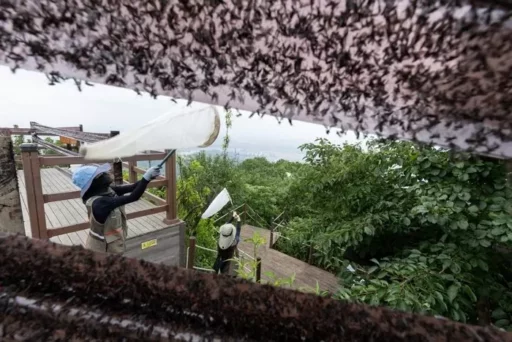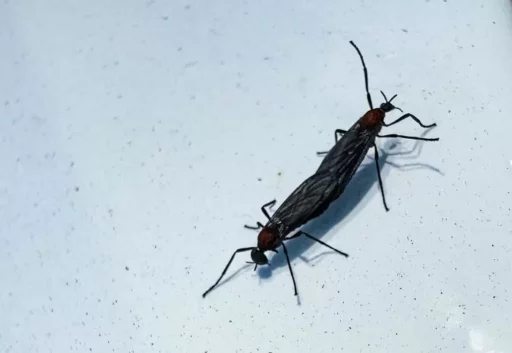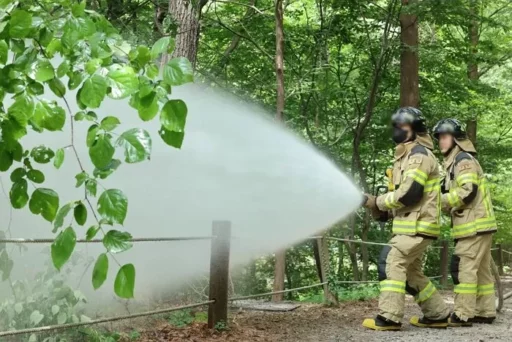Lovebug's Temporary Disappearance, Experts Warn "The Real Crisis is Next Year"
The lovebug (red-backed cloth fly), which has covered various urban areas and caused inconvenience for citizens, suddenly vanished recently.
However, experts warn that this is just a temporary phenomenon, and the true crisis will come next year, as adult insects have already laid millions of eggs underground before dying.
The real crisis will arrive next year.

Professor Shin Seung-kwan from the Department of Life Sciences at Seoul National University recently explained the nature of lovebugs and the reasons for their outbreaks on the YouTube channel "Understanding."
According to him, the lovebug is an invasive species that entered from China's Shandong Peninsula. Various factors, including the absence of natural predators, abundant food resources, and ecological disruptions, have all contributed to its large-scale outbreak.
Professor Shin emphasized the necessity of establishing long-term response strategies, stating, "The lovebugs from China will plague us for the next 30 years."
Although lovebugs are not direct hygiene pests, their mass outbreaks lead to considerable discomfort among citizens. Lovebugs have a short lifespan as adults and exhibit a tendency to be attracted to light.
In particular, climate change and urban heat island effects create a favorable environment for lovebugs to survive the winter, increasing the possibility of their spread to southern regions in the future.
Decrease in Complaints about Lovebugs, But It's Too Early to Relax

In Gyeonggi-do's Yeongdeungpo-gu, one of the regions most severely affected by lovebug damage this year, complaints surged to 473 during June alone, over seven times higher than the same period last year (62 cases). However, the situation changed dramatically in July, with only 31 related complaints filed from the 1st to the 11th.
The disappearance of adult lovebugs is a natural ecological phenomenon.
Adults are typically active for only about a week between June and July before disappearing all at once. The concern lies in what happens afterward.
According to the National Institute of Biological Resources, a female lovebug can lay between 300 and 500 eggs. These eggs hatch into larvae that live underground for about a year, meaning that even if they are not currently visible, the likelihood of a massive outbreak next year is very high.
The activity range of lovebugs is also gradually expanding.

Fears are rising that lovebugs could spread to other areas next year as their habitat extends into natural environments such as parks, forests, and riverbanks, following their presence in Seoul’s Eunpyeong-gu and Incheon’s Gyeong-gu.
Long-Term Pest Control Measures Without Ecological Disruption Necessary
Recent posts in online communities have reported sightings of sparrows and mantises preying on lovebugs; however, experts indicate that "no specific natural predator that solely targets lovebugs has been discovered."
Moreover, applying pesticides in the natural forests where lovebugs primarily reside poses the risk of disturbing the ecosystem, underlining that biological pest control is needed rather than chemical methods.
Just as the population of the flower Bug was suppressed by the discovery of natural enemies like parasitoid wasps, experts advise that "research is needed to find and cultivate potential natural enemies of lovebugs."
Professor Shin Seung-kwan emphasizes, "Rather than short-term pest control, long-term strategies focusing on the recovery of biodiversity and scientific research are essential."

Currently, lovebugs are not designated as a pest for nationwide control, but some local governments and health offices are enhancing their own monitoring and response efforts.
Experts unanimously agree that it is urgent to establish preemptive pest control measures considering larval activities.
Image source: On the 4th, employees from the Ministry of Environment and affiliated agencies are conducting pest control operations using blowers and insect nets to remove adult lovebugs actively working around Gyeongsan Mountain in Gyeonggi-do. / News1, News1


